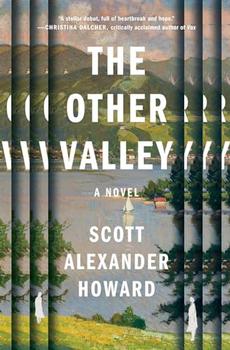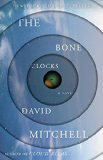Summary | Excerpt | Reviews | Beyond the book | Read-Alikes | Genres & Themes | Author Bio

 Book Reviewed by:
Book Reviewed by:
Pei Chen
Buy This Book
For fans of David Mitchell, Ruth Ozeki, and Kazuo Ishiguro, an elegant and exhilarating literary speculative novel about an isolated town neighbored by its own past and future, and a young girl who spots two elderly visitors from across the border: the grieving parents of the boy she loves.
Sixteen-year-old Odile is an awkward, quiet girl vying for a coveted seat on the Conseil. If she earns the position, she'll decide who may cross her town's heavily guarded borders. On the other side, it's the same valley, the same town. Except to the east, the town is twenty years ahead in time. To the west, it's twenty years behind. The towns repeat in an endless sequence across the wilderness.
When Odile recognizes two visitors she wasn't supposed to see, she realizes that the parents of her friend Edme have been escorted across the border from the future, on a mourning tour, to view their son while he's still alive in Odile's present.
Edme—who is brilliant, funny, and the only person to truly see Odile—is about to die. Sworn to secrecy in order to preserve the timeline, Odile now becomes the Conseil's top candidate. Yet she finds herself drawing closer to the doomed boy, imperiling her entire future.
A breathlessly moving "unique take on the intersection of fate and free will" (Nikki Erlick, author of The Measure), The Other Valley is "a stellar debut, full of heartbreak and hope wrapped up in gorgeous prose" (Christina Dalcher, author of Vox).
Chapter 1
I used to stand alone by the cloakroom door. In the morning before school, and again when the lunch bell rang and the others ran out to the field, I walked to the same spot and rested my head on the sharp crags of stucco. An outcrop of shadow protected the wall from the autumn heat. With folded hands I stood in the shade, gazing at the backwoods and waiting out the day.
I took up my station at the rear of the school after Clare's parents moved downtown, leaving me friendless in the neighborhood. I sometimes ran into her at the store or on the boulevard, but as our mothers chatted, our scant talk revealed that our common ground had been only literal, the adjoining area between our yards. The new neighbors were old and seemed to wear housecoats all day. And so, at school, I became the girl by the door: Odile who stands by herself. Never spoken to and seldom spoken of. Staring at nothing with eyes like carved wood, as motionless as an effigy.
Before the bell called everyone in, I ...
Scott Alexander Howard's debut novel is set in a lush alternate reality: a series of villages spread across valleys, each twenty years apart. The Conseil's sole job is to protect the status quo of time, weighing the benefit of providing grieving petitioners a moment of comfort with the risk of interference in the past or future that might change the direction of events for any of the villages, particularly their own. Odile is poised for a brilliant career with them when her friend Edme upends it all. The landscape of Howard's novel is predicated on a metaphor of dimensions, using the spatial dimension of geography as a stand-in for time. The Conseil decides who is physically allowed to leave and enter a different valley to mourn. Despite this, the book is not about geopolitics or grief and grieving, but rather, the impact of monumental decisions on the trajectory of one's life. It is a coming-of-age tale that stretches into adulthood and beyond...continued
Full Review
 (668 words)
(668 words)
(Reviewed by Pei Chen).
Exploring alternate realities through time travel is a familiar subject across fiction. Traditionally, the mechanism for making such a feat possible is the invention of a new technology: a time machine, a spaceship that can go faster than the speed of light, etc. Yet books built around these high-tech means often come with a mind-bending interpretation of physics that makes your head hurt. While H.G. Wells' The Time Machine is a classic tale, sometimes you're just in the mood for something different.
Luckily, heavy sci-fi works aren't the only stories that deal with the theme of traveling through and potentially changing the course of time. Scott Alexander Howard's The Other Valley brings time travel into the realm of physical ...

If you liked The Other Valley, try these:

by David Mitchell
Published 2015
An elegant conjurer of interconnected tales, a genre-bending daredevil, and master prose stylist, David Mitchell's new novel, The Bone Clocks, crackles with invention and wit.

by Kazuo Ishiguro
Published 2006
A tale of deceptive simplicity that slowly reveals an extraordinary emotional depth and resonance – and takes its place among Kazuo Ishiguro's finest work.





The House on Biscayne Bay
by Chanel Cleeton
As death stalks a gothic mansion in Miami, the lives of two women intertwine as the past and present collide.

The Flower Sisters
by Michelle Collins Anderson
From the new Fannie Flagg of the Ozarks, a richly-woven story of family, forgiveness, and reinvention.

The Funeral Cryer by Wenyan Lu
Debut novelist Wenyan Lu brings us this witty yet profound story about one woman's midlife reawakening in contemporary rural China.
Your guide toexceptional books
BookBrowse seeks out and recommends the best in contemporary fiction and nonfiction—books that not only engage and entertain but also deepen our understanding of ourselves and the world around us.